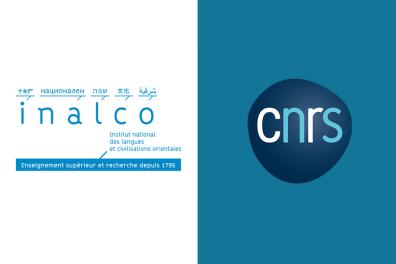Inalco signs partnership agreement with CNRS

Antoine Petit, President and CEO of CNRS, and Jean-François Huchet, President of the Institut national des langues et civilisations orientales, signed on October 25 a partnership agreement for the period 2019-2024. The agreement between the two establishments acknowledges their willingness to share the strategy that will underpin the high level of research carried out by the 8 scientific teams they oversee.
The aim of the six-year agreement between CNRS and Inalco is to specify the elements of a shared scientific policy, as expressed through the management of joint research structures, and its operational implementation by ratifying fundamental agreements on their management and operation.
It is the fruit of close consultation between the two partners on the administrative practices to be harmonized, to simplify the day-to-day work of scientists, and thus strengthen the conditions for excellence. This ambition is also shared by the other higher education and research partners present on the site. The partnership between Inalco and CNRS is strengthened by the links forged around the IdEx "Université de Paris", of which CNRS and Inalco are members of the consortium, and around the Alliance Sorbonne Paris Cité.
7 mixed research units:
- IFRAE - Institut français de recherche sur l'Asie de l'Est (CNRS/Inalco/Université de Paris) ;
- LLACAN - Langage, Langues et Cultures d'Afrique Noire (CNRS/Inalco) ;
- SEDYL - Structure et Dynamique des Langues (CNRS/Inalco/IRD) ;
- LACITO - Langues et Civilisations à Tradition Orale (CNRS/Inalco/Université Sorbonne Nouvelle) ;
- CRLAO - Centre de recherches linguistiques sur l'Asie orientale (CNRS/Inalco/EHESS) ;
- CASE - Centre Asie du Sud-Est (CNRS/Inalco/EHESS) ;
- CeRMi - Centre de Recherche sur le Monde Iranien: Langues, cultures et sociétés de l'Antiquité à nos jours (CNRS/Inalco/Université Sorbonne Nouvelle)
1 research federation:
- CIST - Collège international des sciences territoriales, in cotutelle with 17 other institutions
The scientific partnership between CNRS and Inalco articulates more particularly two major fields of the Human and Social Sciences on which the seven joint teams have achieved a very high level of national and international visibility:
- Areal studies: Teams specializing in the study of major world areas develop research across a broad disciplinary spectrum that includes the humanities (literature, arts, communication and media, etc.), history (particularly cultural, social, political and religious history, archaeology and philology), language and cultural didactics, and the social sciences (anthropology, sociology, political and economic sciences, law, geography, urban planning, demography). Based on in-depth knowledge of the field and privileged access to sources in local languages, studies of the Near and Middle East, Central, South and East Asia, Southeast Asia, Oceania and sub-Saharan Africa are particularly concerned. The fields and objects of research studied from an interdisciplinary perspective are very diverse in nature: qualitative and quantitative data from research fields, archival data, works and creations, visual and audiovisual captures and recordings, technical devices and artifacts, ... They serve the comparative description and understanding of social and cultural systems and dynamics located in geographical areas of the non-Western world.
- Research on, and documentation of, the languages of the world: brought together in the LabEx Fondements Empiriques de la Linguistique (EFL), which has facilitated methodological convergences between the various mixed units, the teams specializing in areal linguistics are developing programs within them of fields of investigation located all over the world in particular in Eurasia, Oceania, Africa and Latin America. Particular attention is paid to the contribution of digital technologies to the creation of linguistic data corpora, multimedia documentation of non-Western languages and cultures, and automatic language processing. Research in this field can draw on a number of shared platforms and tools, such as those offered by the TGIR Huma Num and by the CCSD (HAL ecosystem). The valorization of data collected and deposited in research warehouses will benefit from the LaCAS platform - Open Archive in Language and Cultural Area Studies, co-produced by Inalco and the Idex "Université de Paris".